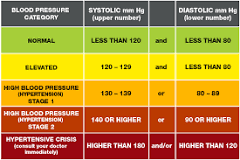Unlocking the Secrets of Blood Pressure: A Guide to Understanding and Managing Your Health
by twib

Understanding Blood Pressure
Blood pressure is a vital sign that measures the force of blood against the walls of your arteries as it circulates through your body. It is recorded as two numbers: systolic pressure (the top number) and diastolic pressure (the bottom number), measured in millimeters of mercury (mmHg).
What Do the Numbers Mean?
Systolic pressure represents the force when the heart beats and pumps blood out, while diastolic pressure is the force when the heart rests between beats. Normal blood pressure is typically around 120/80 mmHg, but this can vary depending on factors such as age, gender, and overall health.
Why Is Blood Pressure Important?
Maintaining a healthy blood pressure level is crucial for overall well-being. High blood pressure (hypertension) can strain the heart and arteries over time, increasing the risk of serious health conditions such as heart disease, stroke, and kidney problems. On the other hand, low blood pressure (hypotension) may cause dizziness, fainting, or organ damage if severe.
How to Manage Blood Pressure
Lifestyle plays a significant role in managing blood pressure. Adopting a balanced diet low in sodium, engaging in regular physical activity, maintaining a healthy weight, managing stress levels, and avoiding tobacco and excessive alcohol consumption are all key factors in keeping blood pressure within a healthy range.
Regular Monitoring
It’s essential to monitor your blood pressure regularly to detect any fluctuations early on. Your healthcare provider can help you understand your readings and provide guidance on lifestyle changes or medication if necessary.
By staying informed about your blood pressure levels and taking proactive steps to maintain them within a healthy range, you can significantly reduce the risk of cardiovascular complications and improve your overall quality of life.
6 Essential Tips for Managing Blood Pressure Effectively
- Maintain a healthy weight through regular exercise and a balanced diet.
- Reduce your salt intake to help lower blood pressure.
- Limit alcohol consumption as excessive drinking can raise blood pressure.
- Quit smoking to improve your overall cardiovascular health and blood pressure levels.
- Manage stress through relaxation techniques like meditation or yoga.
- Regularly monitor your blood pressure and consult a healthcare professional if it’s consistently high.
Maintain a healthy weight through regular exercise and a balanced diet.
Maintaining a healthy weight through regular exercise and a balanced diet is a key tip for managing blood pressure effectively. By engaging in physical activity and choosing nutritious foods, you can support your cardiovascular health and reduce the strain on your heart and arteries. Exercise helps to improve circulation and strengthen the heart muscle, while a balanced diet rich in fruits, vegetables, whole grains, and lean proteins can contribute to lower blood pressure levels. Making these lifestyle choices not only benefits your blood pressure but also enhances your overall well-being and quality of life.
Reduce your salt intake to help lower blood pressure.
Reducing salt intake is a simple yet effective tip to help lower blood pressure. Excessive salt consumption can lead to fluid retention, causing an increase in blood pressure. By cutting back on salt in your diet, you can reduce the strain on your heart and arteries, promoting better cardiovascular health. Opting for fresh, whole foods and flavouring meals with herbs and spices instead of salt can make a significant difference in managing your blood pressure levels and improving overall well-being.
Limit alcohol consumption as excessive drinking can raise blood pressure.
Limiting alcohol consumption is an important tip for maintaining healthy blood pressure levels. Excessive drinking can lead to a spike in blood pressure, putting strain on the heart and increasing the risk of cardiovascular issues. By moderating alcohol intake and being mindful of its effects on blood pressure, individuals can take proactive steps towards better heart health and overall well-being.
Quit smoking to improve your overall cardiovascular health and blood pressure levels.
Quitting smoking is a crucial step towards enhancing your cardiovascular health and managing your blood pressure effectively. Smoking not only damages the blood vessels and increases the risk of heart disease but also elevates blood pressure levels, putting additional strain on the heart. By eliminating this harmful habit, you can significantly improve your overall well-being, reduce the risk of cardiovascular complications, and work towards maintaining a healthier blood pressure range. Making the decision to quit smoking is a powerful choice that can have long-lasting benefits for your heart health and quality of life.
Manage stress through relaxation techniques like meditation or yoga.
Managing stress is crucial for maintaining a healthy blood pressure level. One effective tip is to incorporate relaxation techniques such as meditation or yoga into your daily routine. These practices can help calm the mind, reduce tension in the body, and promote overall well-being. By taking time to unwind and de-stress through mindfulness activities, you can positively impact your blood pressure and enhance your overall cardiovascular health.
Regularly monitor your blood pressure and consult a healthcare professional if it’s consistently high.
Regularly monitoring your blood pressure is a crucial step in maintaining your overall health. If you find that your blood pressure readings are consistently high, it is important to consult a healthcare professional promptly. High blood pressure, if left unmanaged, can lead to serious health complications such as heart disease and stroke. By seeking medical advice and taking proactive steps to address elevated blood pressure levels, you can effectively manage your cardiovascular health and reduce the risk of associated conditions.
Understanding Blood Pressure Understanding Blood Pressure Blood pressure is a vital sign that measures the force of blood against the walls of your arteries as it circulates through your body. It is recorded as two numbers: systolic pressure (the top number) and diastolic pressure (the bottom number), measured in millimeters of mercury (mmHg). What Do…
